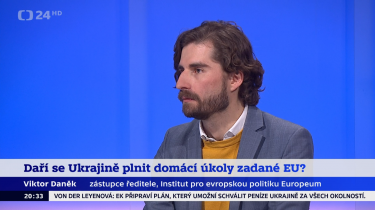Euractiv | More wind, less coal. What are the benefits of wind energy for the Czech Republic?
Coal has been an important part of the Czech economy for decades. As a fossil fuel, however, it is a significant producer of greenhouse gases, especially CO2. Our Research Fellow Jonathan Lyons and Senior Research Fellow Kateřina Davidová write in their commentary about the benefits of decarbonisation and switching to wind energy.
Show more
BLOG | Gender quotas in business: the European Union and its strategy for equality
Even in the most developed countries in the world of today, there is still inequality between men and women, especially in the top public positions. One way of tackling this problem is gender quotas, which the European Union has now taken up in a business context. You can read about the adopted directive and the EU's overall strategy to address the under-representation of women in our intern Natálie Hendlingerová's new blog.
Show moreBLOG | European Certificate of Parenthood - will children have the same rights?
Up to two million children may currently have difficulties in having their parentage recognised within the EU. This is due to different laws in different Member States, which often severely restrict children's rights. The European Commission's proposal, supported by a vote in Parliament, aims to harmonise these different approaches and thus create a more child-friendly situation. Read more in our intern Veronika Vráblíková's new blog.
Show moreINVITATION | Czechia 2030: how to support green transformation and not throw money out the window?
We invite you to a conference on energy transition, meaningful investment and social security in Czech society, which will take place on Monday 20 November 2023 at 13:00 at the European House in Prague.
Show moreINVITATION | Half-time of the EU’s Recovery and Resilience Facility: What have we learned so far?
We would like to invite you to a debate on "Half-time of the EU’s Recovery and Resilience Facility: What have we learned so far?" that is organized as a part of the Prague European Summit. The debate will take place on Wednesday, 15th of November 2023, from 17:30 to 18:30 at the Prague University of Business and Economics.
Show moreCommentary | how to think about unanimity in the EU
With the opening of accession talks with Ukraine and Moldova, the debate in the European Union on the transition from unanimity to qualified majority voting in some areas has been reignited. Although this is not a new debate, it is worth looking at the current situation, describing the problems caused by unanimity and proposing concrete solutions. For more, see Vit Havelka's commentary.
Show moreINVITATION | Resilience of civil society and media In the Eastern Partnership: for Democracy and Inclusivness
We invite you to a debate on civil society and media resilience in the Eastern Partnership, that will take place on 15 June 2023 in Brussels. Whether you attend in person or online, you can look forward to discussions divided into two thematic panels and expert perspectives on the state of civil society in the Eastern Partnership countries of the European Union.
Show moreDeník N | Ukraine, Moldova and Georgia to the EU?
Last week, the European Union decided to open accession talks with Ukraine and Moldova, while Georgia became a candidate for membership. The countries are embarking on a multi-year journey towards integration, on which many obstacles lie - if only because parts of them are occupied by the Russian Federation. Our senior researcher Jana Juzová commented for Deník N on what awaits these countries, and the whole of the EU-27, in connection with this decision in the coming years.
Show moreČT24 | Is Ukraine succeeding in fulfilling its homework set by the EU?
Viktor Daněk, deputy director of EUROPEUM, was a guest on the 90' programme on the ČT24 television station, where he commented on the European Council summit. The summit approved accession negotiations with Ukraine. He also evaluated Hungary's role at the summit itself.
Show morePolicy Paper | Overcoming barriers to unlock potential for a Just Transition in Czechia
The energy transition focuses on the swift and full decarbonization of our economies by moving away from fossil fuels such as coal, natural gas and oil towards carbon-free and preferably renewable energy sources such as wind, solar, geothermal, bioenergy and hydropower. The global community agreed to limiting the global average temperature to 1.5C to prevent worsening of potentially irreversible effects of climate change. Writes Jonathan Lyons.
Show moreStaroměstské náměstí 4/1
Prague 1 - Staré Město
110 00
tel.: +420 212 246 552
email: europeum@europeum.org
https://www.europeum.org









